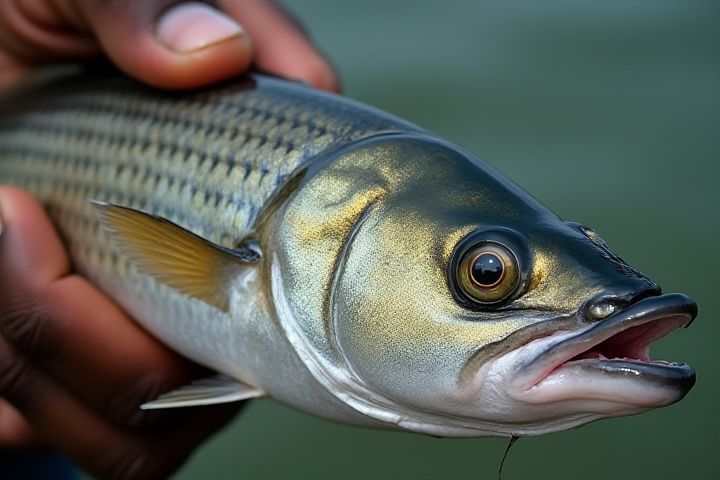
Fisheries in Nigeria contribute significantly to the nation's economy, providing a vital source of protein for millions and employing over two million people. The country's diverse aquatic ecosystems, including rivers, lakes, and coastal waters, support a wide variety of fish species such as tilapia, catfish, and sardines. Aquaculture has seen remarkable growth, driven by advancements in fish farming techniques and increasing domestic demand for fish products. However, challenges such as overfishing, pollution, and inadequate infrastructure threaten the sustainability of Nigeria's fisheries. Sustainable practices and effective management strategies are essential for preserving this critical resource for future generations.
Artisanal fishing predominance
Artisanal fishing is the primary method of fishing in Nigeria, where small-scale fishers utilize traditional techniques and local knowledge to capture various fish species. This practice significantly contributes to the livelihoods of coastal communities and plays a crucial role in food security across the nation. The primary species targeted include tilapia, catfish, and other freshwater varieties, which are essential to the local diet and economy. Your support for sustainable fishing practices can help preserve aquatic ecosystems and enhance the resilience of artisanal fisheries in Nigeria.
Inland and coastal diversity
Nigeria's fisheries sector is characterized by a rich diversity of both inland and coastal fish species, crucial for the country's food security and economic development. Inland fisheries thrive in rivers, lakes, and floodplains, supporting livelihoods and providing essential proteins to local populations. Coastal fisheries are equally significant, leveraging the extensive coastline along the Atlantic Ocean, which is home to an array of marine species. Sustainable practices are increasingly emphasized to protect these vital resources and ensure their availability for future generations.
Aquaculture development
Nigeria's fisheries sector is increasingly prioritizing aquaculture development to enhance food security and economic growth. The country's abundant water resources, including rivers, lakes, and coastal areas, provide an ideal environment for fish farming. Aquaculture practices, such as tilapia and catfish production, play a crucial role in boosting local fish supply and reducing reliance on imports. By investing in sustainable aquaculture, you contribute to the livelihood of communities while promoting environmentally friendly practices in the fishing industry.
Key employment source
Fisheries in Nigeria serve as a crucial employment source, engaging millions of individuals in coastal and inland communities. The sector contributes significantly to the country's economy, providing livelihoods through both commercial and artisanal fishing practices. Sustainable fish farming initiatives are also gaining traction, promoting aquaculture as a viable alternative to overfishing in natural waters. By investing in this industry, you can not only support local economies but also help enhance food security and biodiversity conservation.
Export potential
Fisheries in Nigeria are increasingly centered around export potential, driven by the country's abundant aquatic resources and diverse fish species. The Nigerian coastline, along with numerous rivers and lakes, supports a thriving fishing industry that meets local demands while eyeing international markets. Key species, such as catfish and tilapia, are cultivated to enhance export quality and standards, meeting global seafood regulations. As a result, investments in sustainable fishing practices are crucial for boosting production and ensuring long-term economic growth in the sector.
Regulatory challenges
Regulatory challenges in Nigeria's fisheries sector significantly hinder sustainable development and economic growth. Overlapping policies and inconsistent enforcement create confusion among stakeholders, impeding compliance with fishing regulations. Illegal, unreported, and unregulated fishing practices exacerbate the depletion of fish stocks, threatening the livelihoods of local communities and food security. Addressing these regulatory challenges is crucial for preserving biodiversity and fostering responsible fishing practices that benefit both the environment and your economic interests.
Sustainability concerns
Fisheries in Nigeria are increasingly emphasizing sustainable practices to protect aquatic biodiversity and ensure long-term viability. Overfishing, habitat degradation, and pollution pose significant threats to fish populations and local communities that rely on fishing for their livelihoods. Initiatives such as the promotion of aquaculture and the implementation of strict fishing regulations aim to balance economic needs with environmental health. You can support these sustainability efforts by choosing responsibly sourced seafood and advocating for policies that protect Nigeria's rich marine resources.
Impact of climate change
The impact of climate change on fisheries in Nigeria is increasingly profound, affecting fish populations and the livelihoods of local communities. Rising sea temperatures and altered precipitation patterns lead to habitat degradation in crucial areas like the Niger Delta, resulting in decreased fish stocks. Additionally, increasing salinity levels disrupt breeding patterns for species such as mullet and catfish, which are vital for local consumption and economic stability. Adapting sustainable fishing practices and enhancing resilience through effective management can mitigate these challenges, ensuring food security and economic health for Nigeria's fishing industry.
Technological limitations
Fisheries in Nigeria face significant technological limitations that hinder sustainable development and productivity. Outdated fishing methods, lack of access to modern equipment, and inadequate processing facilities compromise the efficiency of fish harvesting and distribution. This inefficiency contributes to overfishing and depletes marine resources, threatening local ecosystems and livelihoods. Implementing advanced technologies, such as GPS for navigation and aquaculture systems, could enhance fishery management and boost economic growth in the sector.
Government initiatives
Nigerian fisheries have seen significant government initiatives aimed at enhancing sustainable practices and boosting local economy. These initiatives include financial support for aquaculture projects, promoting modern fishing techniques, and enforcing regulations to prevent overfishing. By investing in infrastructure improvements, the government seeks to improve fish processing and distribution channels, thereby increasing the quality of fish available in local markets. Engaging local communities through education and training programs helps ensure that fishermen adopt environmentally friendly practices while securing their livelihoods.
